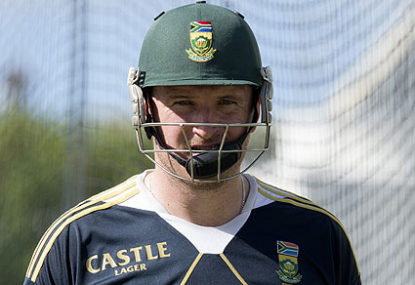In cricket, as in any field of endeavour, there are victories that in time undermine the premise of the battle.
Why bother wielding bat and bowling ball when the odds are obscenely insuperable? Does it make sense for mounted cavalry to take to the field against tanks? When waged in conditions of total war, cricket loses its appeal.
It doesn’t so much remain a battle as a slaughter, a lame excuse, in fact, to begin the battle. The paying public might as well stay home and keep their earnings for some other spectacle. Titanic victories are as boring as indeterminate draws.
South Africa’s cricket captain Graeme Smith is one of the worst exponents of the game in that sense. He might be leading a team at the top of the international cricket tree but his imagination is impoverished.
He allows matches to assume a somnambulist quality at stages. He meanders, and allows his team to wander into rudderless waters. Smith often places the game on autopilot, waiting for the wicket rather than changing the environment that will allow the wicket to fall. When cornered, he hopes that a barnacled defence against an aggressive attack will work.
When he has moved into an unassailable position, Smith attacks in the hope of annihilating his enemy. To him, inventive thinking in times of crisis is unspeakably foreign. He has the unvarnished tactical acumen of Field Marshal Montgomery (of World War II fame) and the blundering disposition of General George McClellan (Union commander during the US Civil War).
Cricket’s captaincy is filled with Tories, liberals and radicals. It is also packed with opportunists and bandits. Surely the worst of any of these must be the conservative captain who lacks faith in his own team to charge to the finishing line unless you have all the bases secured.
This is often a product of fear – previous defeats hang heavily over leadership. They constitute the syphilis of tacticians.
At times when Allan Border’s Ashes sides were annihilating his opponents, there is little doubt that lurking in his bruised psyche was the spirit of Ian Botham. It did not matter than Botham was past his best or even playing in the side – what mattered was the past, with its asphyxiating weight.
Many decisions are often made not on a moment’s change of circumstances but on a moment’s reflection of the past.
The most notable radical captain was no doubt cricket’s greatest all-rounder, West Indian darling Sir Garfield Sobers.
In 1968, in the fourth Test in Port of Spain, Trinidad, he set England a target of 215 runs with 165 minutes to spare. The West Indies at that point were a comfortable 2/92. The dour English side, who had, in Sobers’ own opinion, done so much to kill off interest in the series, won with seven wickets to spare.
Sobers, himself the finest appellation of beautiful, attacking cricket, was pilloried despite having a series of peerless majesty with bat and ball. Not even the West Indian management or senior players claimed to know of his ideas behind the declaration. The talented and the daring are punished for their initiative.
The first two Test matches of this South African-Australian series showed Smith in all his shades of command: brute power, unreflective field placements, baffling bowling changes and an overly cautious declaration.
A few wickets in the Australian top order would fall. An indifferent South Africa then would allow Mike Hussey and Michael Clarke to mark their ascendancy. For a few years now, the Australian top order has proven brittle, making the overworked middle order vulnerable. This was not something Smith’s team exploited, for the most part.
Smith was fortunate to have a determined Faf du Plessis get the South Africans out of well-deserved gaol with his fighting century on debut in the second Test. Their victory in Perth is a deception of grand proportions, though the cricketing chroniclers will no doubt say that good, and even great sides, need their moments of ‘luck’, a fabled nonsense if ever there was one.
At Perth, the Proteas, having survived the second Test, proceeded to make short work of the Australians. The South African pace attack, remarkably meek despite having such figures as the lauded Dale Steyn, fired. (If a well regarded pace bowler can’t fire at the WACA, why fire at all?)
It could be argued that Smith’s refusal to declare, allowing the Australian side to bowl out the South Africans, was testament to his opponents. Be wary of Warner, Hussey and Clarke. And there might be an off-chance that Ricky Ponting might mark his final Test match with a blinding century.
This, however, is false logic, if one considers Smith as having any logic to being with. In continuing to bat to the point of making Australia chase a total over 623 runs in the final innings, he conceded the weakness of his side. One might be the best cricketing outfit in the world, but don’t trust that label.
It was the reaction of a brute – the bully who fears that his day will come, and his bluff called. Best, then, to bloody and batter your opponents into submission, snuffing out any chance of a counter attack. This, in the end, is not the cricket we need.
Binoy Kampmark was a Commonwealth Scholar at Selwyn College, Cambridge. He lectures at RMIT University, Melbourne.






























































































